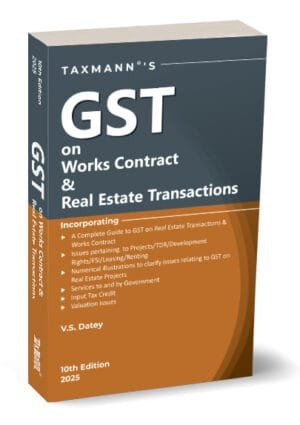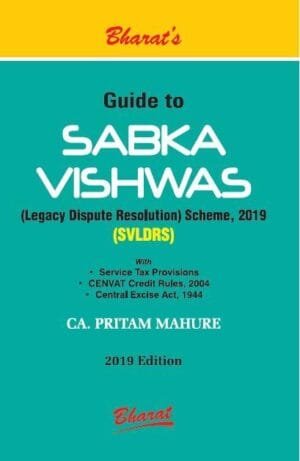Taxmann Practical Guide to GST Compliances By D S Agarwala
Taxmann Practical Guide to GST Compliances By D S Agarwala
This book addresses individuals’ critical issues with GST law and offers practical solutions. The authors present numerous problems and preventive, corrective, and defensive approaches to tackle them. Written in accessible, non-technical language, the book ensures that even those without a legal background can understand and resolve their GST-related challenges.
This book provides a comprehensive overview of the problems within GST law and their potential solutions. While not every issue is presented in a question-and-answer format, many are explained through insightful commentaries that provide detailed answers. The book also employs tabular formats for easy comprehension.
Blending question-and-answer sections, commentaries, tables, and diagrams, this book provides a complete perspective on GST law, making it an invaluable resource for anyone seeking to understand and get practical solutions to the complex landscape of GST.
The Present Publication is the 2nd Edition | 2024, authored by CA. D.S. Agarwala, CA. Vikash Kumar Banka and CA. (Dr) Ayush Saraf. The law stated in this book is updated till 15th May 2024. The noteworthy features of the book are as follows:
- [Easy Understanding of ‘Supply to Return’ Cycle] This book covers various types of supply such as:
- Non-GST Supply
- Taxable Supply
- Non-Taxable Supply
- Exempt Supply
- Nil-Rated Supply
- [Explanation of Reverse Charge Mechanism] Presented in the simplest possible manner for easy comprehension
- [Determination of GST Rates] Based on classification principles, making it easy to understand and apply
- [Practical Issues & Suggestions] Addresses common problems and offers practical solutions in areas such as:
- Supply, including provisions and practical issues
- Valuation, with various practical scenarios and solutions
- Invoicing
- Time of Supply
- Input Tax Credit, with detailed and micro-level analysis
- Registration, including a detailed commentary on common mistakes, possible repercussions, and solutions
- Accounts and Records
- Detention of Goods & Vehicles
- Transfer of Business due to the death of the proprietor
- [Standard Operating Procedures for Filing Returns (GSTR-1 and GSTR-3B)] Detailed procedures for taxpayers and professionals to minimise mistakes and errors
- [Complete Guide to GST Refunds] Includes all relevant provisions, circulars, notifications, etc., for each refund category in one place
- [Two-Way GST Accounting System] Ensures effective monitoring of input tax credit and output liability
- [Standard Operating Procedures for Finalization of Accounts] Focuses on important areas such as:
- Auditors’ Report
- Directors’ Report
- Notes to Accounts
- Balance Sheet
- Profit & Loss Account
- Reporting GST transactions in Form 3CD
- Assessing Form 26AS from the Perspective of GST Law
- [Audit by GST Department] Covers audits under section 65 of the CGST Act, 2017
- [Defensive Measures] Provides strategies for dealing with departmental proceedings
- [MIS Reports Generated by GSTN] Includes practical suggestions for utilising these reports
- [Tax Audit Report (Form 3CD) & Companies Audit Report] Addresses GST-related transactions, ensuring comprehensive coverage
The structure of this book is designed to guide readers through the complexities of GST law in a logical sequence:
- [Introduction to GST] The first chapter provides an overview of the basic structure of the GST Law and its essential concepts
- [Concept of Supply] The second chapter addresses the definition of supply in detail, covering the ‘Supply to Return’ cycle and various types of supplies, including Non-GST Supply, Taxable Supply, Non-Taxable Supply, Exempt Supply, and Nil-Rated Supply
- [Reverse Charge] The third chapter explains the reverse charge mechanism and associated issues
- [Valuation] The fourth chapter discusses the valuation of goods and services under GST, presenting various practical scenarios and their solutions
- [Classification of Goods & Services and Determination of GST Rate] The fifth chapter focuses on the classification of goods and services and the determination of GST rates
- [Place of Supply] The sixth chapter covers provisions and practical issues related to the place of supply
- [Invoicing, Credit & Debit Notes] The seventh chapter explains the provisions related to invoicing, credit notes, and debit notes, detailing possible scenarios and their solutions
- [Time of Supply] The eighth chapter elaborates on the time of supply provisions and addresses related practical issues
- [Input Tax Credit] The ninth chapter provides a critical analysis of the issues taxpayers face in availing input tax credit and offers detailed solutions
- [Payment of Tax] The tenth chapter discusses the provisions for the payment of tax under GST
- [SOP for Filing of Returns (GSTR-1 & 3B)] The eleventh chapter offers a standard operating procedure for filing returns, aiming to minimise errors and mistakes
- [Refund] The twelfth chapter is a comprehensive guide to claiming refunds, consolidating all relevant provisions, circulars, and notifications
- [Annual Return and Reconciliation Statement] The thirteenth chapter details the provisions for annual returns and reconciliation statements
- [Registration] The fourteenth chapter provides a detailed commentary on registration provisions, common mistakes, repercussions, and solutions
- [Accounts and Records] The fifteenth chapter emphasises the importance of maintaining proper accounts and records under GST and offers defence strategies for unintentional non-compliance
- [GST Accounting Treatment] The sixteenth chapter discusses the accounting treatment of GST transactions
- [SOP Before Finalization of Accounts] The seventeenth chapter offers a detailed SOP on checkpoints before finalising accounts, covering auditors’ reports, directors’ reports, notes to accounts, balance sheets, profit & loss accounts, reporting GST transactions in Form 3CD, and assessing Form 26AS
- [Audit by GST Department] The eighteenth chapter addresses issues faced during departmental audits under section 65 of the CGST Act 2017
- [Assessment] The nineteenth chapter covers the provisions related to assessment under sections 61, 62, 63, and 64 of the CGST Act 2017
- [MIS Reports] The twentieth chapter discusses various MIS reports generated under GST and offers practical suggestions for their use
- [Transfer of Business (Due to Death of Proprietor)] The twenty-first chapter provides a detailed commentary on the procedure for transferring business in case of a proprietor’s death, including relevant notifications and legal provisions
- [Detention, Seizure & Release of Goods and Conveyances in Transit] The twenty-second chapter elaborates on the provisions for detention, seizure, and release of goods and conveyances in transit, addressing practical problems and solutions.
- [Overview of GST Portal – Dashboard] The final chapter provides a brief overview of the GST Portal – Dashboard
About the author
D.S. Agarwala
CA D.S. Agarwala is a practising chartered accountant with over 30 years of experience in audit and taxation. He is also a fellow member of the Institute of Company Secretaries of India and DISA qualified. He is an empanelled faculty of the Institute of Chartered Accountants of India and was a special invitee to the GST & Indirect Taxes Committee of the ICAI for 2019-2020 and 2020-2021. In 2016, he was appointed convener of the West Bengal Study Group on Indirect Taxes formed by ICAI to work closely on various GST-related issues. As a convener of the group, he has subsequently contributed to preparing background materials on GST, FAQs and MCQs on GST, a revised technical guide on Annual Return and GST Audit and a guidance note on accounting treatment on GST. He was also invited as a faculty member to provide GST training to the Commercial Tax Department of West Bengal senior officers. He is Sr. Vice-President and Advisor to DTPA’s GST & Indirect Tax Committee. He has contributed extensively to various professional journals on service tax and GST. At various forums, he has addressed seminars, conferences, workshops, and study circle meetings on GST and service tax.
Vikash Kumar Banka
CA Vikash Kumar Banka is a practising chartered accountant. He has secured All India 31st rank in CA intermediate Exam held in May 1998. He has over 20 years of experience in audit, direct and indirect taxation, and his core expertise lies in analysing legal provisions from a practical perspective. He provides consultancy to various business houses on a wide range of issues and also handles their litigation matters. He also provides ERP/Accounting software implementation services in line with GST, as well as the implementation of newly introduced e-invoicing system. He was invited to be a faculty member for providing training to Audit team officers of Bihar Commercial Taxes. Before that, he was part of a GST training programme for senior officers of the Commercial Tax Department of West Bengal up to the level of Joint and Special Commissioners. He was a Special Invitee to the Kolkata Study Group formed by the Indirect Tax Committee of ICAI. He has actively contributed to preparing a Revised technical guide on GST Annual Return, Guidance Note on Accounting Treatment on GST and vetting of ‘Background material on GST’ and Guidance Note to Bank branch Audit. He has to his credit many write-ups and articles in various magazines and Tax Guru. He is a regular speaker on various GST related topics at different forums.
Ayush Saraf
CA (Dr.) Ayush Saraf is a practising-chartered accountant. He is also a qualified company secretary, lawyer, and DISA. He has vast experience in GST matters, audits, and income tax matters and specialises in litigation. He is an empanelled faculty of the Institute of Chartered Accountants of India to the GST & Indirect Taxes Committee of the ICAI. He has a doctorate and has submitted his thesis on ‘The Impact of Implementation of Ind AS in Financial Statements of Select Nifty Fifty Companies’. He also contributes articles on various issues related to the GST law in various forums. He is an eloquent speaker on GST Law on various forums. He is also a motivational speaker on various forums. He is the Vice-Chairman of the Guwahati Branch of the Institute of Chartered Accountants of India. He has been a guest faculty member for various government and non-governmental organisations. He is a prominent face in local news channels over financial and taxation issues.
| Weight | 0.53 kg |
|---|---|
| bookauthor | Ayush Saraf, D.S. Agarwala, Vikash Kumar Banka |
| binding | Paper back |
| edition | 2nd Edition May 2024 |
| hsn | 49011010 |
| isbn | 9789356221833 |
| language | English |
| publisher | Taxmann |
Related products
Original price was: ₹1,545.₹1,155Current price is: ₹1,155.













Pooja Law House GST Law and Commentary with Analysis and Procedures (Set of 4 Volumes) By Bimal Jain and A2Z Taxcorp LLP Edition September 2024
₹7,695Original price was: ₹7,695.₹3,799Current price is: ₹3,799.